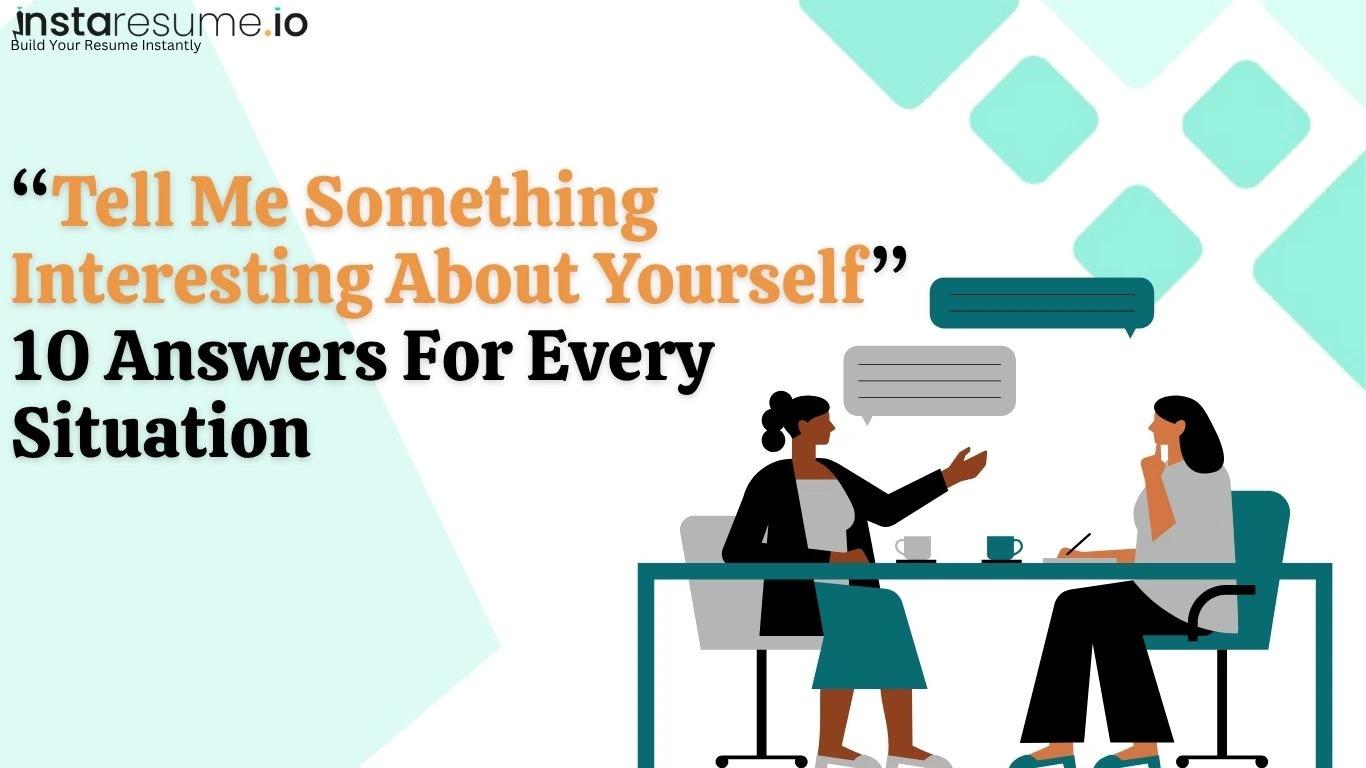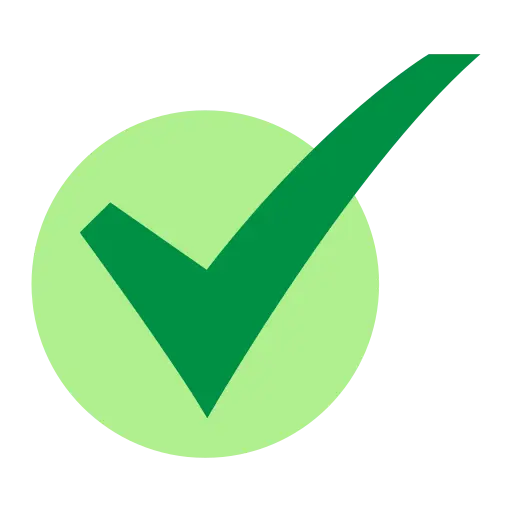10 “Tell Me Something Interesting About Yourself” Answers for Every Situation
Trust Score: 4.8
362 reviews

Table of Contents
🔹 Introduction: Why This Question Matters More Than You Think
“Tell me something interesting about yourself” may sound like a casual icebreaker, but it’s actually a golden opportunity to make a memorable impression. Whether you’re in a job interview, a networking event, or introducing yourself in a group setting, this question gives you space to stand out—not just with your qualifications, but with your personality.
It often shows up in places where people want to know more than your resume—settings like campus placements, company onboarding, team icebreakers, or even LinkedIn DMs. Most people answer it with something forgettable. That’s where you can shine.
A thoughtful, well-crafted response can instantly make you more relatable, showcase a hidden talent, or highlight a unique quality that aligns with your career or goals. It’s not about telling the most outrageous story—it’s about being authentic, confident, and interesting in a way that fits the moment.
In the next sections, we’ll look at different types of “interesting” answers based on your scenario—so you’re always ready with the right mix of charm and professionalism.
🔸 Section 1: Professional Scenarios – Smart Yet Personal Answers
In interviews or career-focused conversations, your answer to “Tell me something interesting about yourself” should strike a balance between professional relevance and personal uniqueness. It’s your chance to show that you’re more than just a list of qualifications—you’re someone with initiative, creativity, and character.
✅ When to use this style of answer:
 Job interviews
Job interviews Career networking events
Career networking events LinkedIn introductions
LinkedIn introductions Internal promotions or mentorship discussions
Internal promotions or mentorship discussions
💬 Sample Answers:
 “I once created a personal expense tracker using Excel, which helped my friends and I save significantly. That experience sparked my interest in data analytics.”
“I once created a personal expense tracker using Excel, which helped my friends and I save significantly. That experience sparked my interest in data analytics.” “In my last role, I volunteered to lead a virtual team-building initiative across five departments—something totally outside my job description, but it taught me a lot about cross-functional collaboration.”
“In my last role, I volunteered to lead a virtual team-building initiative across five departments—something totally outside my job description, but it taught me a lot about cross-functional collaboration.” “I maintain a newsletter where I simplify business and tech news for non-experts. It started as a side hobby, but now it has over 800 subscribers.”
“I maintain a newsletter where I simplify business and tech news for non-experts. It started as a side hobby, but now it has over 800 subscribers.”
🎯 Tips to Make It Effective:
 Choose something that reflects curiosity, leadership, or a job-relevant soft skill.
Choose something that reflects curiosity, leadership, or a job-relevant soft skill. Keep the tone confident but conversational.
Keep the tone confident but conversational. Bonus points if the “interesting” fact connects naturally to your career goals or current role.
Bonus points if the “interesting” fact connects naturally to your career goals or current role.
🔸 Section 2: Icebreakers & Networking – Keep It Fun but Sharp
When you're in a casual or semi-professional setting—like a new team intro, workshop, or social mixer—this question is less about your resume and more about showing personality. It's a low-pressure way to connect, be memorable, and maybe even spark a good conversation.
✅ When to use this style of answer:
 Team-building events
Team-building events Orientation sessions
Orientation sessions Workshops, conferences, or networking mixers
Workshops, conferences, or networking mixers Casual meet-and-greets
Casual meet-and-greets
💬 Sample Answers:
 “I once traveled through six Indian states on just ₹5000, relying entirely on local transport and food. It was chaotic—but I learned a lot about planning under pressure!”
“I once traveled through six Indian states on just ₹5000, relying entirely on local transport and food. It was chaotic—but I learned a lot about planning under pressure!” “I'm obsessed with puzzles—escape rooms, riddles, brain teasers. I even run a monthly puzzle club with my friends.”
“I'm obsessed with puzzles—escape rooms, riddles, brain teasers. I even run a monthly puzzle club with my friends.” “I review coffee shops as a side hobby and have a spreadsheet with ratings on ambience, WiFi, and espresso strength.”
“I review coffee shops as a side hobby and have a spreadsheet with ratings on ambience, WiFi, and espresso strength.”
🎯 Tips to Make It Effective:
 Be playful but self-aware. Avoid going too off-topic or edgy.
Be playful but self-aware. Avoid going too off-topic or edgy. Choose something light that invites curiosity or follow-up questions.
Choose something light that invites curiosity or follow-up questions. Humor and quirkiness are welcome—just keep it respectful and professional-adjacent.
Humor and quirkiness are welcome—just keep it respectful and professional-adjacent.
🔸 Section 3: Academic or Fresher Context – Confident & Curious
If you're a student, recent graduate, or early-career professional, you may feel like you don’t have “enough experience” to give an interesting answer. But this question is your chance to highlight curiosity, creativity, and initiative—qualities that matter just as much as work history.
✅ When to use this style of answer:
 Campus placements
Campus placements College orientation or group introductions
College orientation or group introductions Internship interviews
Internship interviews SOPs or admission interviews
SOPs or admission interviews
💬 Sample Answers:
 “I taught myself video editing during the pandemic, and now I make short documentaries on social topics for my college’s YouTube channel.”
“I taught myself video editing during the pandemic, and now I make short documentaries on social topics for my college’s YouTube channel.” “I co-founded a virtual book club during lockdown that now includes students from 15+ colleges across India.”
“I co-founded a virtual book club during lockdown that now includes students from 15+ colleges across India.” “Though I’m a Political Science major, I’ve been learning Python and built a tool to visualize voter turnout patterns across different states.”
“Though I’m a Political Science major, I’ve been learning Python and built a tool to visualize voter turnout patterns across different states.”
🎯 Tips to Make It Effective:
 Focus on initiative—what you learned or created outside of your coursework.
Focus on initiative—what you learned or created outside of your coursework. Tie your answer back to skills like leadership, digital fluency, or communication.
Tie your answer back to skills like leadership, digital fluency, or communication. If possible, mention measurable outcomes (reach, results, recognition).
If possible, mention measurable outcomes (reach, results, recognition).
❓ FAQs: “Tell Me Something Interesting About Yourself” – How to Answer It Smartly
1. What is the best way to answer “Tell me something interesting about yourself” in an interview?
The best way to answer this question in a job interview is to highlight a unique personal fact that also aligns with the professional qualities employers value. For example, if you’re interviewing for a data analyst role, you might say:
“I created a personal budget tracker in Excel that helped my friends cut their monthly expenses by 25%. It made me realize how much I enjoy working with data and solving real-life problems.”
This response is interesting, personal, and job-relevant. It also showcases initiative and problem-solving skills—traits recruiters look for.
Pro Tip: Focus on facts that demonstrate qualities like curiosity, leadership, creativity, or resilience—while staying concise and confident.
2. Can I use a fun or quirky fact as my interesting answer during networking events or orientation?
Yes, in networking or icebreaker situations, fun and quirky facts are not only acceptable—they’re encouraged. These settings are meant to humanize you, make you relatable, and open doors for natural conversation.
For example:
“I’ve reviewed over 100 local coffee shops and rate them based on espresso strength and Wi-Fi speed—I call it ‘The Brew Index.’”
This type of answer makes you approachable and memorable. It adds personality without needing to tie directly to your job.
Just avoid controversial or overly personal facts. Keep it light, professional-adjacent, and safe for all audiences.
3. What are some good examples of “interesting facts” for students or freshers?
If you’re a student or fresher, your answer can focus on side projects, self-learning, academic achievements, or unique hobbies. You don’t need professional work experience to say something meaningful.
Example for a college student:
“I started a YouTube channel during lockdown where I simplify political concepts in Hindi. It now has over 3,000 subscribers and helped me become more confident in public speaking.”
This kind of answer works well in campus interviews, group discussions, or SOPs, as it showcases initiative, creativity, and communication skills.
Other good fresher examples:
 “I co-host a podcast on Indian mythology and its cultural influence today.”
“I co-host a podcast on Indian mythology and its cultural influence today.” “I taught myself Figma and designed mock apps for NGOs during college.”
“I taught myself Figma and designed mock apps for NGOs during college.”
4. Is it okay to prepare and rehearse this answer? Won’t it sound scripted?
Absolutely, it’s not only okay—it’s highly recommended to prepare and rehearse your answer. Just ensure you don’t memorize it word-for-word in a robotic tone. The goal is to sound confident and conversational, not mechanical.
Practicing your “interesting fact” helps:
 Eliminate unnecessary filler words
Eliminate unnecessary filler words Avoid awkward pauses
Avoid awkward pauses Stay within the 30–45 second ideal time limit
Stay within the 30–45 second ideal time limit Adapt smoothly to different audiences (HR, hiring manager, peer group, etc.)
Adapt smoothly to different audiences (HR, hiring manager, peer group, etc.)
A prepared answer shows clarity of thought, self-awareness, and communication strength—qualities that make a great impression.
5. What if I genuinely don’t have anything interesting to say?
This is a common concern—but trust us, everyone has something interesting to share, even if it doesn’t feel extraordinary to you. The key is perspective and presentation.
Here are ways to discover your “interesting fact”:
 Reflect on hobbies or side activities (gaming, volunteering, journaling, cooking)
Reflect on hobbies or side activities (gaming, volunteering, journaling, cooking) Think of times you learned something on your own or helped others
Think of times you learned something on your own or helped others Look at unusual experiences: solo travel, contests won, events organized
Look at unusual experiences: solo travel, contests won, events organized Consider childhood skills or passions you’ve kept up over time
Consider childhood skills or passions you’ve kept up over time
Example:
“I’ve been journaling every day since I was 14—it’s helped me stay organized and self-aware.”
This may seem small, but it's unique, consistent, and reflective. How you frame your story is often more impactful than the fact itself.






